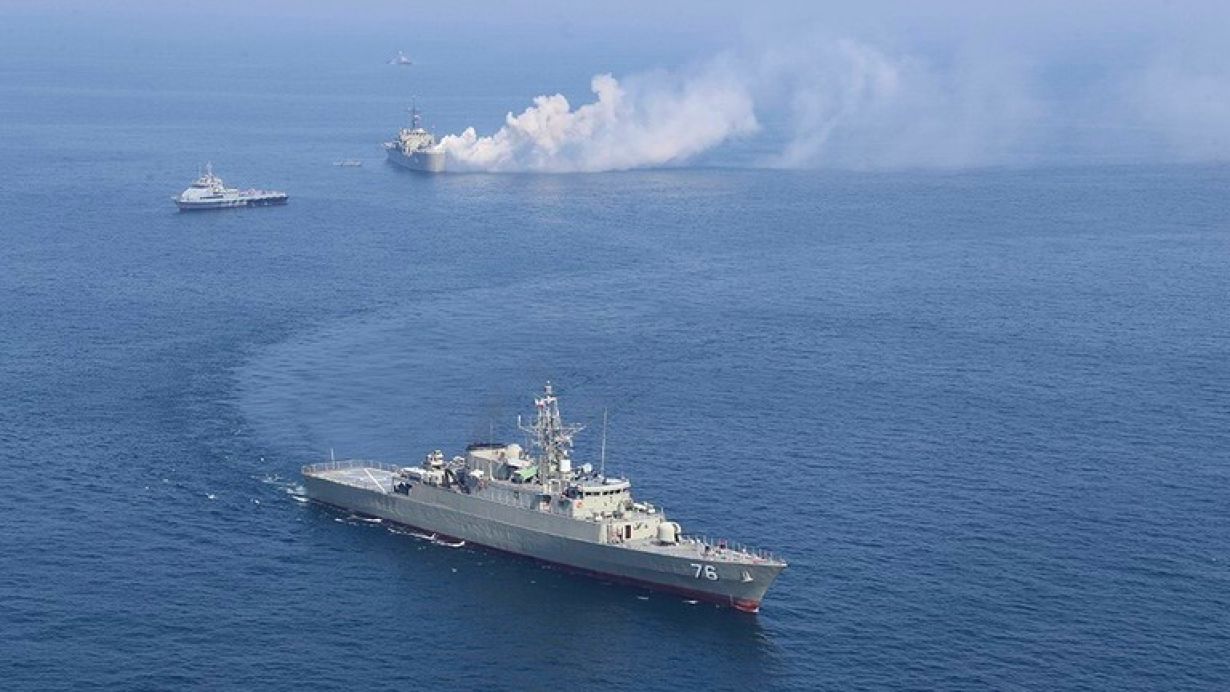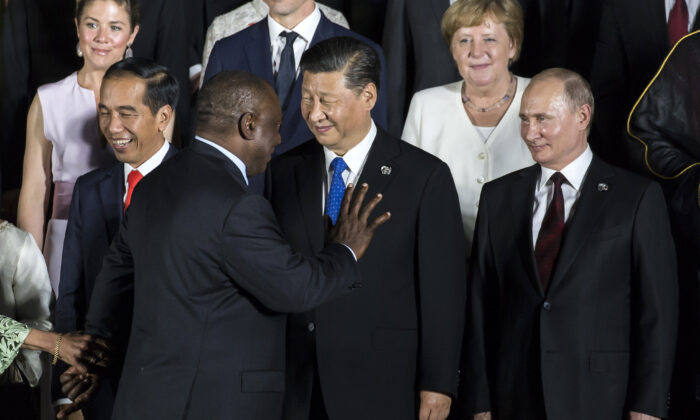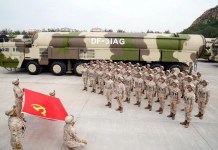South Africa, on January 19, confirmed plans to conduct joint naval drills with the Russian and Chinese navies off its east coast next month, around the first anniversary of Russia’s invasion of Ukraine on February 24.
The drills would bring more focus on the strengthening relationships between Russia and China with South Africa, the leading voice on the African continent and one of several African countries that abstained in a United Nations vote last year deploring Russia’s invasion.
The multinational maritime exercise, called “Operation Mosi,” which means smoke in Tswana — one of 11 official languages in South Africa – will be held from February 17-27, off South Africa’s east coast near the cities of Durban and Richards Bay.
The South African government had refused to condemn Russia’s aggression in Ukraine last year, saying it has a neutral stance over Ukraine and calling for dialogue and diplomacy. However, the upcoming naval drills have led the country’s main opposition party to blame the government for siding with Russia.
“This gives the impression of not being neutral but being biased to one side. It can alienate us from other important trade partners, the West,” said Kobus Marais, the shadow defense minister for the Democratic Alliance. “This is in the best interests of Russia,” Marais said, calling it “another bad judgment, an embarrassment.”
The SA National Defence Force || Media Statement || Thursday, 19 January 2023 || SA to host the People’s Liberation Army Navy from China and Russian Federal Navy during the Multilateral Maritime Exercises over period 17 to 27 February 2023.#SANDF#DCCMediaLiaison#SANavy pic.twitter.com/QiDU2rBalF
— SA National Defence Force (@SANDF_ZA) January 19, 2023
Notably, the announcement of naval drills came ahead of Russian Foreign Minister Sergey Lavrov’s visit to South Africa to hold talks with his counterpart Naledi Pandor.
Relations Between South Africa, Russia, And China
South Africa’s relations with Russia go back to the Cold War era when the Soviet Union (USSR) supported the country’s now-ruling African National Congress (ANC) party in its struggle against the apartheid regime that carried out repression against the country’s Black majority. During that time, several ANC cadres were educated and trained in the Soviet Union.
Apartheid ended in 1994 when the ANC won the first democratic elections in South Africa, and Nelson Mandela became president.
Likewise, several other African countries, which abstained during the UN General Assembly’s resolution to deplore the Russian invasion, were supported by the Soviet Union during their independence struggles.
These include Algeria, Angola, Guinea, Madagascar, Mozambique (whose flag features a Kalashnikov), Namibia, and Zimbabwe, all of which are still ruled by parties that saw the Soviet Union as their ally and consider Russia to be its successor.
After the Soviet Union’s disintegration in 1991, it mainly withdrew from Africa. However, since around 2007, the African continent has been Russia’s foreign policy priority, with Moscow establishing new ties and refreshing its alliances formed during the Cold War.

Russia has been increasing its political, military, and other economic involvement in the continent. Its influence in the region can be explained chiefly in energy interventions, particularly nuclear and gas, security, and weapon sales.
China is said to have supported African independence movements, providing moral support, weapons, and military training. The Chinese Communist Party’s (CCP’s) communist ideology, just like the Soviet Union, offers it a similar advantage to Russia.
Also, China has invested much more in the continent than Russia, and its influence in the region can be explained through massive infrastructure projects, project financing, and investments in the extractive industries.
Countries like Ethiopia, Kenya, Tanzania, and Zambia have benefited from Chinese rail projects as part of the country’s Belt and Road Initiative (BRI) set up in 2013. Also, China is the top trading partner for countries like South Africa and Kenya.
South African President Cyril Ramaphosa, shortly after the 2019 Russia-Africa summit in Sochi, said that investments from Russia and China in the African continent are a change from the extractive and exploitative colonial powers of the West.

“We are ever mindful of our colonial history, where the economies of Europe were able to industrialize and develop by extracting resources from Africa, all the while leaving the colonies underdeveloped,” said Ramaphosa in a letter addressing South Africans after the summit.
China, Russia, the OECD countries, and other large economies are eager to forge greater economic ties with African countries because they want to harness the current climate of reform, the deepening of good governance, macro-economic stability, and the opening up of economies across the continent for mutual benefit,” he further said.
Ramaphosa’s sentiments are shared by several African leaders who describe Chinese and Russian presence on the continent as a counter to the effects of Western colonization and the continued unequal terms of the Western engagement with Africa, for example, the complete disregard shown by NATO for the African Union during its intervention in Libya in 2011.
South Africa Also Chairs The BRICS Block
South Africa is also a member of the BRICS bloc of emerging countries alongside Brazil, Russia, India, and China. Recently South Africa assumed the chairmanship of the block.
Last year, during the 14th summit of the BRICS block, President Ramaphosa said that in 2021, 17% of South Africa’s exports went to BRICS countries and that over 29% of total imports also came from them.
“These countries are therefore significant trading partners, and the value of this trade is continuing to grow… Total South African trade with other BRICS countries reached R702 billion in 2021, up from R487bn in 2017,” he said.
As of present, BRICS-member countries collectively represent about 26% of the world’s geographic area and are home to 2.88 billion people, about 42% of the world’s population. This year, under the chairmanship of South Africa, the block will consider adding more members who have applied for membership and expressed interest in joining.

Algeria, Argentina, and Iran have already applied to join BRICS, while Saudi Arabia, Turkey, and Egypt have announced their interest in becoming the block’s members.
Last year, after his visit to Saudi Arabia in October, President Ramaphosa said that Crown Prince Mohammed bin Salman Al Saud had expressed the desire to join BRICS.
“The Crown Prince did express Saudi Arabia’s desire to be part of BRICS. They are not the only country seeking membership in BRICS,” according to the local radio station ABC.
“That BRICS summit next year under the chairship of South Africa, the matter of expanding BRICS is going to be seriously considered. Several countries are consistently making approaches to BRICS members, and we have given them the same answer, that the BRICS partners will discuss it and thereafter a collective decision will be made,” Ramaphosa elaborated.
- Contact the author at tanmaykadam700@gmail.com
- Follow EurAsian Times on Google News




